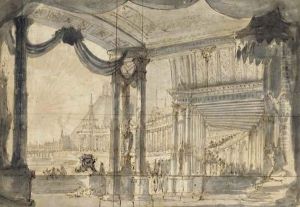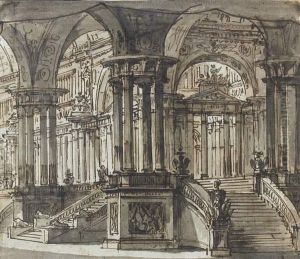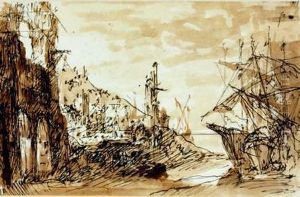Fabrizio Galliari Paintings
Fabrizio Galliari was an Italian painter and scenic designer, born in 1709 in Bard, a small town in the Piedmont region of Italy, and died in 1790. His life and career spanned most of the 18th century, a period marked by significant changes in art and society. Galliari was part of a family of artists, which included his brother Giovanni Battista Galliari, with whom he often collaborated. This familial connection played a crucial role in his development and career, providing him with both inspiration and opportunities to work on a variety of projects.
Fabrizio Galliari's work was primarily focused on scenography and fresco painting, contributing significantly to the decoration of numerous palaces and theaters throughout Italy. His style was deeply influenced by the Baroque and Rococo movements, characterized by its dramatic effects, rich colors, and elaborate details. Galliari's talent for creating illusionistic space and his ability to capture the dynamic energy of the theatrical environment made him a sought-after artist in the realm of scenic design.
Throughout his career, Galliari worked on several important commissions. One of his most notable projects was the decoration of the Teatro Regio in Turin, where his work exemplified his mastery of perspective and his ability to create a sense of depth and realism. His frescoes and scenic designs not only enhanced the architectural spaces they inhabited but also played a significant role in the evolution of scenic art in Italy.
Despite his contributions to the art world, Fabrizio Galliari's name is not as widely recognized today as some of his contemporaries. However, his work remains an important part of the study of 18th-century Italian art, offering insights into the period's aesthetic preferences and the development of scenic design. Galliari's legacy is preserved in the collections of various museums and in the surviving decorations of buildings and theaters he worked on, serving as a testament to his artistic skill and creativity.


